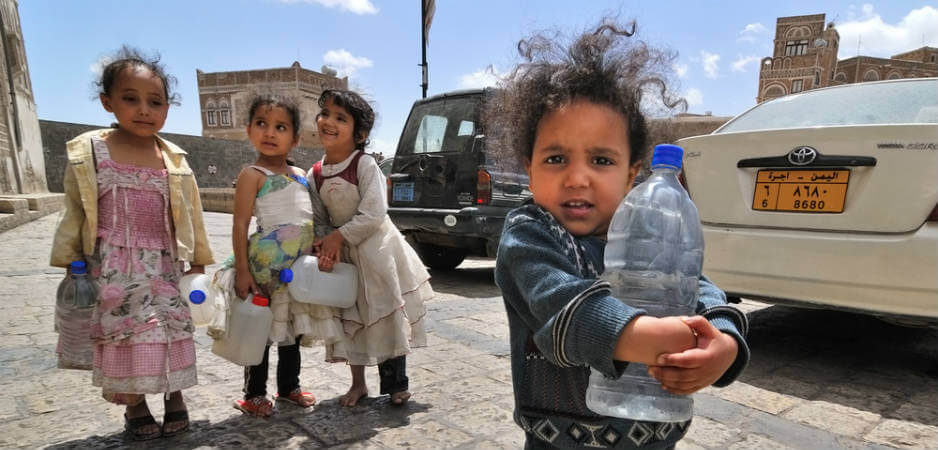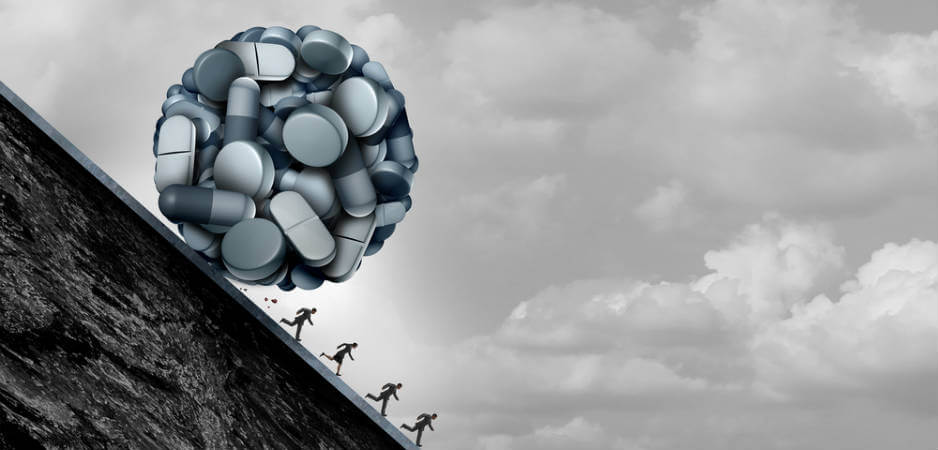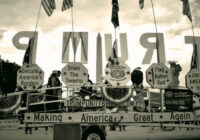When asymmetries of power amplify, so do cases of abuse and instances of the wealthy and the well-connected getting away scot-free.
As expected, Republican senators sunk Trumpcare. The March 26 edition of The World This Week analyzed the failure of Republican congressmen in the House of Representatives to replace Obamacare, a piece of legislation they have reviled for years. President Donald Trump and his acolytes managed to whip recalcitrant congressmen to fall in line, but senators are an obstreperous bunch and have torpedoed Trumpcare.
Even as Trumpcare sank, John McCain was diagnosed with brain cancer. The 80-year-old senator was the Republican candidate against Barack Obama in 2008 and had earlier lost in the primaries to George W. Bush. The former prisoner-of-war is an American icon and has not been terribly fond of Trump. His death or resignation might be as significant for the Senate and for American politics as Ted Kennedy’s death in 2009.
To be fair to the Trump administration, it made one big call this week that was right. It ended the covert program of the Central Intelligence Agency in Syria to arm and train so-called moderate rebels. Obama began this program in 2013 and it has turned out to be a spectacular disaster. The Washington Post predictably excoriated Trump for ending the program, painting it as a concession to Russia and a strategic blunder. The Atlantic was more objective and balanced in pointing out this program “was never particularly bold to start with” and “was already a shadow of its former self.”
Even as American politics continued to suck all the oxygen in New York and London media rooms, India and China squared off over Doklam plateau. This territory is claimed by Bhutan, India’s loyal ally, and by China. Kanwal Sibal, a former foreign secretary, denounced Beijing’s “swelling hubris and increasing acts of bullying.” In turn, Global Times declared that China cannot afford to “lose an inch” of territory, denounced Indian aggression and reminded its southern neighbor of its humiliating defeat in 1962.
Even saber rattling by two nuclear powers was beaten to second place this week by the release of a rather chilling report. Over six decades, Catholic priests abused hundreds of choir boys in Germany.
CRIMES AND IMPUNITY
In 2015, Amnesty International released a report, Crimes and Impunity, about the de facto amnesty for Americans responsible for torture. It called for “a thorough investigation into the CIA secret detention, rendition and interrogation programs with a view to bringing to justice all those suspected of being involved in torture and enforced disappearance.” Needless to say, none of this transpired and the Trump White House has nominated the man who authored the “torture memo” in the George W. Bush administration to a plum post.
It seems injustice is a feature of all institutions and the Catholic Church is no exception. For years, the world’s biggest religious club has suffered “a raft of allegations of child sex abuse by priests and an inadequate response by bishops.” From the United States to Australia, the record of the Catholic Church has come under scrutiny. Many reports have uncovered a systematic culture of secrecy, denial and cover-up. The Boston Globe won the Pulitzer Prize and Spotlight triumphed at the Oscars for telling the story of child sex abuse in Boston and retelling the story of the investigation of the abuse respectively.
 The most recent report in Germany is yet another black mark against an institution that has a history of crusades, inquisitions, forced conversions, fetters on freedom of thought, Galileo Galilei’s persecution, Giordano Bruno’s immolation and more. To be fair, the Catholic Church also has a record of pious friars, humble monks and kind nuns who have performed social service in different parts of the world. Pope Francis recently penned an encyclical letter “on care for our common home” that focuses on climate change and global inequality, two of the great challenges of our era. Yet he has said little on the child sex abuse scandals that continue to tumble out of the woodwork.
The most recent report in Germany is yet another black mark against an institution that has a history of crusades, inquisitions, forced conversions, fetters on freedom of thought, Galileo Galilei’s persecution, Giordano Bruno’s immolation and more. To be fair, the Catholic Church also has a record of pious friars, humble monks and kind nuns who have performed social service in different parts of the world. Pope Francis recently penned an encyclical letter “on care for our common home” that focuses on climate change and global inequality, two of the great challenges of our era. Yet he has said little on the child sex abuse scandals that continue to tumble out of the woodwork.
The German episode of this sordid Catholic saga is deeply unsettling. Reportedly, 49 functionaries of the church abused at least 547 young members of the Regensburger Domspatzen boys’ choir between 1945 and the 1990s. The perpetrators are unlikely to face criminal charges because of the amount of time that has elapsed. According to the BBC, victims have described the experience as “a prison, hell and a concentration camp.” Sadly for the victims, there will be no Nuremberg trials and justice will not only be delayed, but it will also be denied.
The release of the report this week raises the fundamental issue of justice. Generations of human beings have wrestled with this thorny issue. Goswami Tulsidas, the early 17th century Indian poet and the author of Ramcharitmanas, penned a line, “samrath ke nahin dos gosain.” It translates as the mighty have no faults. Even in terms of physical assets, the Catholic Church far exceeds an Exxon Mobil or an Apple. The Sistine Chapel and Notre Dame are invaluable pieces of real estate that even these companies cannot acquire. More importantly, the Catholic Church is a receptacle of tradition, a repository of truth and a haven for spirituality for hundreds of millions. In Americano lingo, its brand value exceeds that of any other organization.
Pope Francis still wields far more power than many heads of state. No Lutheran minister, no Muslim cleric, no Hindu priest, no Buddhist monk and no self-help guru can compete. For devout Catholics, he is infallible and the institution he represents cannot be questioned. This blind belief gives priests incredible power. As the cliché goes, power corrupts and priests have proved to be no exception. Some of them abuse the trust reposed in them. A few abuse children and perhaps only a tiny minority sexually abuse children. This is only to be expected given what we know of human nature. So, one cannot blame Pope Francis and the Catholic Church too much for child sex abuse. However, many rightly blame the leader and the institution for sweeping abuse under the carpet.
The story of this scandal is tied up with faith. History is proof of the fact that most people need to believe in something. For instance, some believe in god, others in their nation and some others in an ideology. Arguably, the ills of the Catholic Church pale in comparison to the communist regime that ran East Germany. Besides, religion has long been the glue that has held together most societies. As the brilliant Gunnar Beck once remarked to this author, “If there is no religion, there will be no morality and superstition will take the place of faith.” However, institutions that live off the faith of others whether it is communists in China or Catholics in Germany have an incentive to ignore inconvenient facts if not deny or obfuscate them.
On the issue of religion, Beck may well be right. Yet he might be wrong too. Religion can cause people to suspend questioning. With its music, rituals and incense, the Catholic Church commands deep deference among its adherents. They like tradition, hierarchy and order. Therefore, they firmly believe that child sex abuse is an aberration not regular practice. To make sure that this deference continues, even perfectly well-meaning bigwigs in the Catholic Church keep trying to cover up instances of abuse. The victims are too traumatized and lack the clout the power of such an entrenched institution, sanctified by age.
Some argue that hierarchy and secrecy are part of the Catholic DNA. For centuries, the Catholic Church maintained the Index Librorum Prohibitorum, which was a list of books that god-fearing souls were meant to avoid. Johannes Kepler and Immanuel Kant were in illustrious company when their works made it to the list, which only disappeared more than two decades after World War II. Many regard this list as a metaphor for an organization that does not quite have the most glorious record when it comes to freedom of speech or transparency. It is only natural that such an organization, with a record of shielding its adherents from supposedly dangerous ideas, is unlikely to be open about its failings, especially when they involve child sex abuse.
Despite the grim record of the Catholic Church, the scandal is shocking because, of all places, it took place in Germany. This is a country that holds the feet of the powerful to the fire more firmly than places like Nigeria, Argentina or the US. Even here, so many over such a long time suffered grievous harm, but justice will still not be done.
TO BE RICH IS GLORIOUS, TO BE A CELEBRITY EVEN BETTER
Purportedly, Deng Xiaoping said, “to be rich is glorious,” when he unleashed the power of the markets in China. In the US, this is 100% true. What is even truer is that to be powerful is even better. Celebrities get away with a lot, including grabbing a certain part of the female anatomy, in the infamous words of the current inhabitant of the White House. As if to prove this point, Bill Cosby, the legendary American comedian with a litany of charges of sexual assault, just got away in court. Nearly 60 women accused him of sexual assault over several decades. However, his criminal trial ended in a mistrial due to a hung jury. Kings and nobles might no longer have the mythical right of prima nocta, but the rich and powerful get away with a lot if they can hire Harvard lawyers.
Jeannie Suk Gersen makes a very powerful argument in The New Yorker. As per Gersen, too many women have accused Cosby with uncannily consistent descriptions of his modus operandi. Apparently, he used his used his “fame and power to lure women, give them incapacitating drugs, and have sex with them without their consent.” In the common law systems of former British colonies, criminal convictions need proof “beyond a reasonable doubt” and clever lawyers can always sway jurors. People may believe in the legal system just as Catholics have faith in the Catholic Church but, even in most heinous cases, there is no guarantee of justice. Just as god tends take the side of big battalions, judges and juries favor those with fat wallets.
In 2016, an athlete at Stanford raped an inebriated young girl and got away quite lightly. The story of the Stanford rape case made S. Suresh argue that “America has a rape problem.” Suresh makes a valid point, but there is another argument to be made. The US system is rigged against the poor, the old and the sick. In particular, the court system favors the wealthy and the well-connected while penalizing the poor and the isolated. The July 10, 2016, edition of The World This Week painted a grim picture of the criminal justice system in the US where 2.3 million people are behind bars, a higher number than repressive Russia and oppressive Egypt. Most of them are poor and black.
The Stanford rapist was rich and white. He was also a minor celebrity. His victim wrote a heartrending letter that went viral but achieved little else. It is not only white men who get away. Rich black men also get away, especially if they are celebrities. R. Kelly, or rather Robert Sylvester Kelly, has a history of getting away with abuse. He has been accused of systematic abuse of underage women. Karen Attiah argues that Kelly’s impunity and continued success is because of the invisibility of black women and girls in the US. Attiah has a point, but she fails to mention that black females are invisible because they are poor and isolated. If any of these abused girls came from wealthy families, Kelly might very well be in jail.
The US is now a deeply unequal society. Furthermore, its processes have thickened to such a degree that the common citizen can easily get lost amidst a Kafkaesque bureaucracy and a labyrinthine legal maze. Justice favors those who can hire lawyers. Consequently, the rich and the well-connected have greater temptations and fewer comeuppances. Not only has the justice system turned unjust, but also social safeguards like an independent press or engaged communities have declined too. So, costs of abuse have come down while benefits have gone up. This makes the poor and the isolated very vulnerable.
Finally, a ferocious cult of success prevails in American society. A Silicon Valley billionaire, a Hollywood star or a champion athlete can do no wrong. They are role models for a society geared for success. Those who get left behind are simply not good enough and deserve little. Not infrequently, packing them off to prison is preferable to sending them to schools. In the mythic land of Uncle Sam, compassion for the poor and vulnerable is in rather short supply. The meek might still inherit this land, but are likely to suffer much abuse before they do so.
*[You can receive “The World This Week” directly in your inbox by subscribing to our mailing list. Simply visit Fair Observer and enter your email address in the space provided. Meanwhile, please find below five of our finest articles for the week.]
War Has Tarnished Afghanistan’s Image
A country once known for its unique culture is now infamous all over the world for producing refugees and extremists.
Afghanistan, which stands at the crossroad of the ancient Asian civilizations, contributed enormous knowledge to the world and produced great scientific minds during antiquity and the Renaissance. It is the land of distinguished scholars and philosophers like Abu Ali ibn Sina (or Avicenna) and Mawlana Jalaluddin Balkhi (better known as Rumi), well-known figures celebrated for the immense contribution they made in various fields of knowledge. Unfortunately, the long-lasting armed conflict in Afghanistan has tarnished its image: A country once known for its unique culture is now infamous all over the world for producing refugees as well as extremists. The catastrophe of war has not only crumbled the law and order machinery of the state, but has also weakened the central government, which often fails to protect the basic… Read more
Ukraine: A Key to Europe’s Future
In some circumstances, Ukrainian membership of the EU could benefit Russia, but no one in Moscow sees it that way.
Control over Ukraine’s fertile land and natural resources has been a source of conflict throughout modern history. The Russian occupation of Crimea, which is part of the sovereign territory of Ukraine, is the first forcible alteration of an international boundary in Europe since the end of World War II. In eastern Ukraine, the conflict between Russian-backed militias and the Ukrainian government led to the shooting down by militants of a passenger airliner full of Dutch holidaymakers heading to the Far East. Ukraine is a democracy, but it is afflicted by corruption and the constant tension between its president and its legislature under its US-style constitution. The country looks to the European Union for salvation, but the EU is turning inward and giving priority to other problems. In an attempt to understand the challenge, I read The Gates of Europe… Read more
Cholera and Collapse of Governance in Yemen
So far, only 15% of Yemen’s needs in terms of humanitarian assistance for 2017 has been funded.
Since April 2017, cholera has taken over 1,600 lives and infected more than 250,000 people in Yemen. Half of those infected are children. The conflict in Yemen has been ongoing for two years. Why did this cholera epidemic break out now? While it is difficult to pinpoint a single explanatory factor, the increased fragility of governance has led to the near collapse of the country’s already fragile water, sanitation and health systems. Another contributing risk factor is Yemen’s worsening famine crisis that has left two-thirds of the population food insecure. Aid and humanitarian agencies are stepping up their responses in an attempt to contain the cholera epidemic. However, unless the conflict de-escalates and governance improves, Yemen remains at risk of facing recurring health crises. In 2015, the Houthi rebel group allied with deposed President Ali Abdullah Saleh and took over the capital… Read more
Barriers to Treating Opioid Addiction
Both the medical community and the US government fall behind on making the treatment of opioid addiction more effective.
Percy Menzies is a pharmacist by training and has worked for almost 18 years for a pharmaceutical company that developed and marketed a range of pain medications like oxycodone and oxymorphone. Even at that time, some 40 years ago, they knew these drugs were not appropriate for long-term use. “They were only for acute pain in hospitalized patients,” says Menzies.
Since then, an epidemic has ensued in the US, with over 33,000 people overdosing on opioids annually. Only recently has an antidote for an opiate overdose become prominent. The same company Menzies worked for, Dupont Pharmaceuticals, developed the antidote, naloxone (or Narcan), over 30 years ago. The antidote reverses the effects of opioids, knocking out opiates from receptors in the brain, which may slow or stop breathing. It is a temporary fix, buying time to get the person to… Read more
Is Retirement Tourism the Answer to South Africa’s Economic Growth?
A growing demographic can help South Africa pour funds into a struggling economy.
The last few years in South Africa saw a deterioration of economic growth and political wrangles around leadership and socio-economic policies. The country is facing both economic and job-growth conundrums. The self-inflicted economic woes affected by political motives have further resulted in the downgrading of South Africa’s credit rating on its foreign borrowings to junk status after the removal of the former Finance Minister Pravin Gordhan in March this year. The critical questions arise: What can South Africa do to weather the economic storms and what can it offer the world? Where to from here? According to Numbeo’s Cost of Living Index, South Africa ranked 91 with an overall cost of living index of 37.76 in 2016, which is almost half compared to most of the developed countries. The Mercer’s 2016 Cost of Living Survey further supports the notion that South African major cities such… Read more
The views expressed in this article are the author’s own and do not necessarily reflect Fair Observer’s editorial policy.
Photo Credit: CURAphotography / Shutterstock.com
Support Fair Observer
We rely on your support for our independence, diversity and quality.
For more than 10 years, Fair Observer has been free, fair and independent. No billionaire owns us, no advertisers control us. We are a reader-supported nonprofit. Unlike many other publications, we keep our content free for readers regardless of where they live or whether they can afford to pay. We have no paywalls and no ads.
In the post-truth era of fake news, echo chambers and filter bubbles, we publish a plurality of perspectives from around the world. Anyone can publish with us, but everyone goes through a rigorous editorial process. So, you get fact-checked, well-reasoned content instead of noise.
We publish 2,500+ voices from 90+ countries. We also conduct education and training programs
on subjects ranging from digital media and journalism to writing and critical thinking. This
doesn’t come cheap. Servers, editors, trainers and web developers cost
money.
Please consider supporting us on a regular basis as a recurring donor or a
sustaining member.
Will you support FO’s journalism?
We rely on your support for our independence, diversity and quality.











